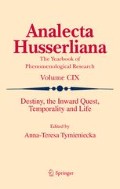Abstract
Moral philosophers often turn to the works of Henry James as a resource. Martha Nussbaum, for instance, reads James’s texts for moral examples of the quest for the good. Robert Pippin’s neo-Hegelian approach, on the other hand, reads James’s texts as capturing the moral ambiguities of living through a major shift in social structure of the Western society. For Nussbaum, James’s language is about the subtle perceptions of the characters and narrators. For Pippin, the novel’s complex syntax and obscure diction capture the uncertainties of social transition. Neither one examines the ontological dimension of James’s approach to language and morality. This paper looks at James’s as a moral philosopher in the line of Charles Taylor and Richard Rorty, for whom questions of morality emerge in the context of the linguistically articulated identities of the individual and community. Through this lens, James is a philosopher of language whose novels display the rupture and repair of semantic packages of moral beliefs. Unlike Nussbaum and Pippin, I maintain that James’s late style needs to be considered as something more than an aesthetic vehicle for ethical content. Instead, it presents a phenomenological and ontological drama that gives moral meaning temporal as well as semantic shapes.
Access this chapter
Tax calculation will be finalised at checkout
Purchases are for personal use only
References
Brandom, Robert. 2000. The vocabularies of pragmatism. Rorty and his critics. Oxford: Blackwell.
James, Henry. 1964. The ambassadors. New York, NY: Norton.
James, Henry. 1909. The golden bowl, 2 vols. New York, NY: Scribners.
James, Henry. 1984. Literary criticism: Essays on literature: American writers, English writers. New York, NY: Library of America.
James, William. 1928. The letters of William James, ed. Henry James.2 vols. Boston, MA: Atlantic Monthly Press.
MacKinnon, Catherine. 1984. Feminism unmodified. Cambridge: Harvard University.
MacKinnnon, Catherine. 2007. Women’s lives, Men’s laws. Cambridge: Harvard University Press.
Nussbaum, Martha. 1990. Love’s knowledge. New York, NY: Oxford University Press.
Pinkard, Terry. 2004. Taylor, ‘History, and the history of philosophy. Charles Taylor, ed. Ruth Abbey, 187–213. Cambridge: Cambridge University Press.
Pippin, Robert. 2000. Henry James and modern moral life. Cambridge: Cambridge University Press.
Rorty, Richard. 2005. Philosophical papers, vol. IV. Cambridge: Cambridge University Press.
Searle, John. 1969. Speech acts: An essay in the philosophy of language. Cambridge: Cambridge University Press.
Steele, Meili. 2005. Hiding from history: Politics and public imagination. Ithaca, NY: Cornell University Press.
Stout, Jeffrey. 2004. Democracy and tradition. Princeton, NJ: Princeton University Press.
Taylor, Charles. 1985. Language and human agency. Cambridge: Cambridge University Press.
Taylor, Charles. 2004. Modern social imaginaries. Durham, NC: Duke University Press.
Taylor, Charles. 1993. The motivation behind the procedural ethic. In Kant and political Philosophy, ed. Ronald Beiner. New Haven, CT: Yale University Press.
Taylor, Charles. 1989. Sources of the self. Cambridge: Harvard University Press.
Veeder, William. 1971. Strether and the transcendence of language. Modern Philology 69: 116–132.
Author information
Authors and Affiliations
Corresponding author
Editor information
Editors and Affiliations
Rights and permissions
Copyright information
© 2011 Springer Science+Business Media B.V.
About this chapter
Cite this chapter
Steele, M. (2011). Moral Shapes of Time in Henry James. In: Tymieniecka, AT. (eds) Destiny, the Inward Quest, Temporality and Life. Analecta Husserliana, vol 109. Springer, Dordrecht. https://doi.org/10.1007/978-94-007-0773-3_11
Download citation
DOI: https://doi.org/10.1007/978-94-007-0773-3_11
Published:
Publisher Name: Springer, Dordrecht
Print ISBN: 978-94-007-0772-6
Online ISBN: 978-94-007-0773-3
eBook Packages: Humanities, Social Sciences and LawPhilosophy and Religion (R0)

